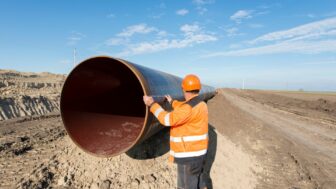Following news that Dominion’s Atlantic Coast Pipeline would obliterate 38 miles of ridgelines in Virginia and West Virginia, several severely impacted residents and business owners spoke at a Richmond press conference detailing their concerns and calling on McAuliffe to reject the pipeline.
RICHMOND, VA — Virginia residents whose lives and property would be destroyed by mountaintop removal — triggered by Dominion Resources’ proposed fracked-gas pipeline — spoke out at a press conference today outside Governor Terry McAuliffe’s office. They demanded the Governor use his full legal authority to stop Dominion’s plan to explode entire ridgetops along 38 miles of mountains to build the controversial Atlantic Coast Pipeline.
According to a new briefing paper, Dominion Resources intends to blast away, excavate, and partially remove entire ridgetops along 38 miles of Appalachian mountains as part of the construction of the Atlantic Coast Pipeline. Similar impacts – although not yet fully inventoried – are expected to come from the construction of a second pipeline to the south: the Mountain Valley Pipeline led by the company EQT.
During the press conference, speakers demanded the Governor use his regulatory power to halt both proposed pipelines. They detailed how their communities will be directly impacted by the shattered ridgelines that will come with the construction of the Atlantic Coast Pipeline. They explained how the Atlantic Coast Pipeline would force businesses to close, lower property values, and harm the tourism economy. Additionally, they detailed how the pipeline would cause irrevocable harms to the natural environment, and increase the threats of water pollution and landslides.
“The proposed pipeline has been a 24/7 nightmare for my wife and I since we first learned of it,” said Bill Limpert, retired environmental regulator and property owner Little Valley, Bath County. “The Atlantic Coast Pipeline would cut our property in half. Then it would leave an 125-foot-wide scar for 3,000 feet along Miracle Ridge, which is now covered by old growth forest — some of it never cut. It would lower our property value by at least 50 percent, and our property would become a toxic asset. It would also leave us well within the blast zone of the pipeline, and we — and a number of our neighbors — are trapped at the head of Little Valley in the evacuation zone with no chance of escape or rescue in a pipeline accident. We would be forced to abandon our retirement home and property if the pipeline is constructed as proposed. We simply cannot live next to this dangerous pipeline or witness the destruction it would bring upon our property, and we will not relent in fighting it with everything we have.”
Engineering and policy experts have examined documents submitted by Dominion to the Federal Energy Regulatory Commission (FERC) and, using GIS mapping software, found that Dominion would require mountaintops to be “reduced” by 10 to 60 feet along the proposed route of the pipeline. For perspective, the height equivalent of a five-story building would be erased in places from fully forested and ancient mountains.
In addition to the expected mountaintop removal, Dominion has yet to reveal how it intends to dispose of at least 247,000 dump-truck-loads of excess rock and soil—known as “overburden”—that would accumulate from the construction along just these 38 miles of ridgetops.
Nancy McMoneagle, President and Executive Director of The Monroe Institute, stated: “The Monroe Institute has done business in Nelson County since 1979, contributing almost $2 million annually to Nelson County’s economy, employing around 50 staff and service contractors. If the Atlantic Coast Pipeline comes through Institute property as is now projected, our operations would be decimated, all these jobs would be lost, and thousands of our customers throughout the world would be left without our services.”
Dominion has submitted a proposal to FERC to build a 42-inch diameter pipeline that would transport natural gas from West Virginia into Virginia and North Carolina. Dominion has attempted to paint the Atlantic Coast Pipeline as an “environmentally-friendly” project. However, its proposed construction method and route selection across and along steep mountains is unprecedented for the region—if not the country—and is viewed as extreme and radical by landowners, conservationists, and engineers. Similar impacts – although not yet fully inventoried – could come from the construction of a second pipeline to the south: the Mountain Valley Pipeline led by the company EQT Midstream Partners, LP.
“Dominion is taking our land in order to destroy the mountain ridge directly over our home,” said Joseph W. McMoneagle, President of the New Land Home Owners Association. “Blasting on Roberts Mountain will destroy this mountain’s stability, and permanently disrupt the delicate underground water supply to more than half a dozen homes in our subdivision. Stripping old growth trees and underbrush will open the mountain ridge to heavy erosion, and future mud and landslides that will overrun our natural mountain springs and streams. Most of our residents are over age sixty, so we have a frequent need for emergency vehicles traveling unhindered in and out of our valley. Because our roads are excessively narrow and steep, it will be impossible to pass Dominion’s pipeline construction trucks during one of those emergencies. Altering our roads will be taking our land without the excuse of a pipeline. I ask the Governor to put an immediate stop to this nonsense before someone is seriously hurt.”
The full briefing paper is available here.
###
Contact:
Denise Robbins, 240-396-2022, denise@chesapeakeclimate.org
Anne Havemann, 240-396-1984, anne@chesapeakeclimate.org





